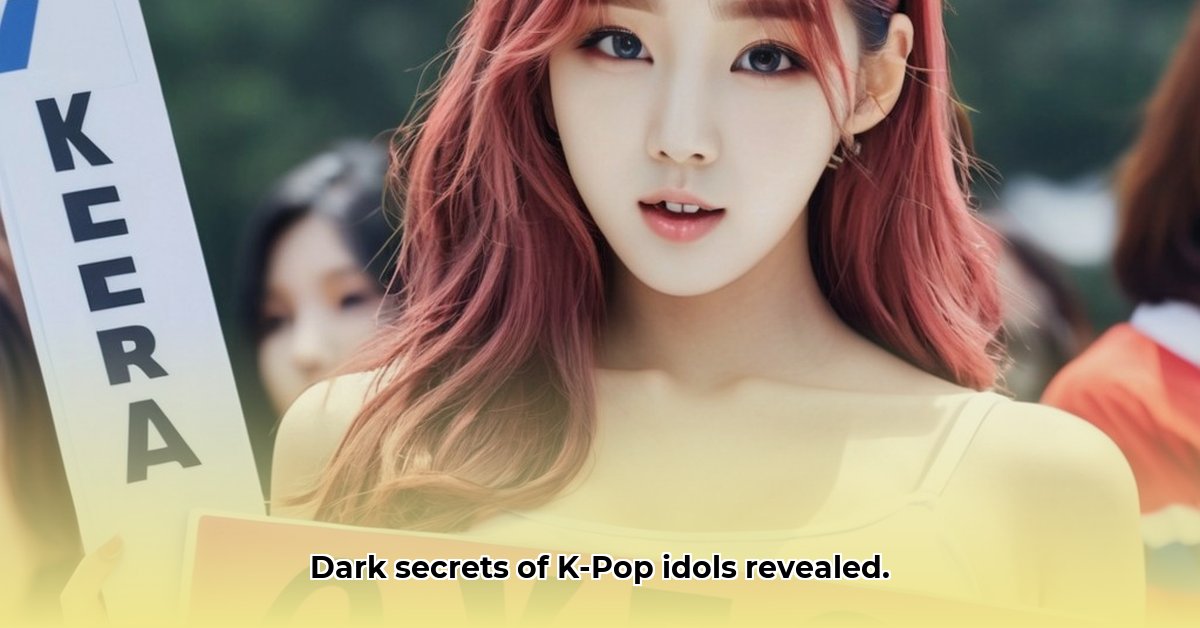K-Pop’s dazzling success often hides a serious problem: too many kids are becoming stars way too young. The pressure is immense, and the system isn’t always set up to protect them. Learn more about the intense K-Pop training process here. This article looks at the tough choices faced by young K-Pop idols, the money that drives the industry, and the ways kids can be taken advantage of. We’ll hear from experts, explore the risks, and suggest ways to make things fairer and safer for these young performers. It’s a complex issue, but understanding it is the first step towards making sure these incredibly talented young people are protected.
The Dark Side of the Dream: When Young Girls Debut as K-Pop Idols
The world sees K-Pop as a glittering landscape of catchy tunes, dazzling performances, and seemingly perfect stars. But behind the brightly colored music videos and dedicated fanbases, lies a harsh reality for many young girls who debut as K-Pop idols. The pressure to succeed is immense, the training grueling, and the potential for exploitation very real. This isn’t just about talented teens pursuing their dreams; it’s a complex issue that raises serious questions about the ethics of the K-Pop industry and the well-being of its youngest stars.
The Gauntlet of K-Pop Training: Competition and Control
Aspiring K-Pop idols often enter rigorous training programs at a shockingly young age, sometimes as young as 11 or 12. These programs, run by entertainment agencies, act as a modern-day gauntlet where young hopefuls endure an intense regimen designed to hone their talents and mold them into marketable stars. Days are packed with vocal lessons, dance rehearsals that can last for 12 hours or more, language classes (often including Korean, English, Japanese, and Mandarin), and media training.
But the training goes beyond skill development. Trainees are subjected to constant evaluation, with their singing, dancing, appearance, and personality all under scrutiny. They often live together in dormitories, isolated from their families and friends, and their lives are tightly controlled by the agency. Strict diets are enforced, sometimes leading to unhealthy eating habits and body image issues. Plastic surgery is often encouraged or even mandated to meet exacting beauty standards.
This intense pressure to conform and succeed can take a severe toll on the mental health of these young trainees. Anxiety, depression, and eating disorders are common, and the lack of privacy and freedom can lead to feelings of isolation and hopelessness. The promise of stardom hangs in the balance, but the odds of actually debuting are slim; many trainees spend years in the system only to be cut before ever reaching the stage.
Profit Over People: The Business of Youth and Idol Health
The K-Pop industry is a multi-billion dollar business, and entertainment agencies are driven by profit. One of the key reasons why they seek out young trainees is that they are seen as more malleable and easier to mold into the “perfect” idol. Younger idols are also perceived as having a longer career lifespan, maximizing the agency’s potential return on investment.
This focus on profit can lead to the exploitation of young talent. Agencies may push their idols to work relentlessly, ignoring their physical and mental health needs. Restrictive contracts often trap idols in unfair financial arrangements, with the agency taking a large percentage of their earnings – especially in the early years when idols are paying off training debts.
The well-being of these young performers is often secondary to the bottom line, raising serious ethical concerns about the industry’s priorities.
The Price of Fame: Scrutiny, Privacy, and Self-Esteem
Even for those who successfully debut as K-Pop idols, the pressures don’t disappear. In fact, they often intensify. The constant public scrutiny, the relentless media attention, and the harsh criticism on social media can be overwhelming, especially for young people who are still developing their sense of self.
Idols are expected to maintain a perfect image at all times, both on and off stage. Every aspect of their appearance, behavior, and personal life is meticulously analyzed and judged. This lack of privacy can be incredibly damaging, leading to anxiety, depression, and a distorted sense of self-worth.
The constant pressure to be perfect can also lead to impossible beauty standards and unhealthy lifestyle choices. Many idols resort to extreme diets, plastic surgery, and other measures to conform to the industry’s ideals, further jeopardizing their physical and mental health.
Cultural Context and Ethical Concerns
South Korea’s cultural norms and legal definitions of adulthood differ from those in many Western countries, which can complicate discussions about the exploitation of young K-Pop idols. What might be considered unacceptable child labor practices in the West may be more readily accepted in South Korea.
Furthermore, some agencies exploit the “youthful appeal” of their idols by employing sexualized concepts and themes, raising serious concerns about the objectification and potential abuse of minors.
These cultural and legal gray areas make it crucial to have open and honest discussions about the ethical boundaries within the K-Pop industry and to advocate for stronger protections for young performers.
Towards a Better Future: Transparency, Regulation, and Support
Addressing the issue of young idol exploitation requires a multi-faceted approach involving entertainment agencies, the South Korean government, fans, and the idols themselves.
Entertainment agencies must prioritize the mental and physical health of their trainees and idols. This includes setting stricter age limits for trainees, providing comprehensive mental health support, fostering a healthier work-life balance, and being transparent about trainee contracts and conditions.
The South Korean government must establish and enforce age-appropriate regulations to protect young performers. This includes increasing oversight of agencies, setting minimum standards for working conditions and mental health support, and collaborating internationally on child labor standards.
Fans and consumers can also play a vital role by supporting artists and companies committed to ethical practices, voicing concerns about potential exploitation, and promoting responsible fan behavior.
K-Pop idols themselves need to feel empowered to seek professional mental health help, build support networks with other idols and mentors, and speak out against exploitative practices without fear of retaliation.
A Collective Responsibility: Protecting Young Talent
The future of K-Pop depends on a shift in values. The industry’s success should not come at the expense of the well-being of its youngest performers. The glamorous image of K-Pop often masks the struggles faced by many, and it’s time for everyone involved to demand better. The goal is to create a system where young girls can pursue their dreams without sacrificing their health and happiness. This requires ongoing discussion, research, and a commitment to protecting young people in this demanding industry.
Mitigating Psychological Risks: Safeguarding Young Performers in K-Pop
The intense environment of the K-Pop industry presents significant psychological risks for underage idols. The relentless pursuit of perfection, coupled with intense public scrutiny, can create a breeding ground for mental health issues. Addressing these risks requires a comprehensive and collaborative approach involving agencies, lawmakers, fans, and the idols themselves.
The Pressure Cooker: A Young Idol’s World
The K-Pop training system often resembles a pressure cooker, subjecting young girls to intense training, relentless competition, and constant public scrutiny. This environment can be detrimental to their healthy development, leading to stress, anxiety, and a diminished sense of self-worth.
The Business of Childhood: Profit vs. Well-being
The success of groups like NewJeans has highlighted the industry’s shift towards debuting increasingly younger idols. While the potential for financial independence is often touted as a benefit, it often comes at the cost of long-term mental and physical health.
The Human Cost: Mental Health and Cyberbullying
Underage idols face immense psychological burdens, including cyberbullying, relentless criticism, and pressure to maintain an unrealistic image. This can lead to sleep deprivation, inadequate nutrition, and a higher risk of anxiety, depression, and eating disorders.
A Systemic Problem: The Need for Reform
The issue is systemic, rooted in the structure of the K-Pop industry. Restrictive contracts, unfair financial arrangements, and a lack of sufficient mental health support contribute to the problem, requiring a holistic and comprehensive solution.
Steps Towards Change: A Collaborative Effort
Here’s how each stakeholder can contribute to creating a safer and more supportive environment for young K-Pop idols:
-
Agencies: Invest in comprehensive mental health programs, implement stricter ethical guidelines, prioritize artist well-being, be transparent with financial dealings, and offer age-appropriate training.
-
Government/Legislators: Enact stronger laws protecting child laborers, increase oversight of agencies, and set minimum standards for working conditions and mental health support.
-
Fans: Practice responsible consumption, educate yourselves about the realities of the industry, support artist advocacy groups, demand greater transparency, and avoid fueling harmful online behavior.
-
Idols: Prioritize your mental and physical health, seek professional support when needed, build support networks, and advocate for fair contracts and better working conditions.
The Road Ahead: Compassion, Action, and Ethical Responsibility
The K-Pop industry faces a critical juncture. It must reconcile its pursuit of profit with its ethical responsibility to protect its youngest stars. Child exploitation cannot be the price of fame. Addressing the psychological risks faced by underage idols requires a collective effort from all stakeholders. The future of K-Pop depends on it.
- Discover Affordable Singing Lessons Near Me to Unlock Your Potential - February 24, 2026
- Affordable Vocal Lessons Bring Professional Singing Guidance Within Reach - February 23, 2026
- Local Vocal Lessons Offer Expert Guidance for Every Singer - February 22, 2026










